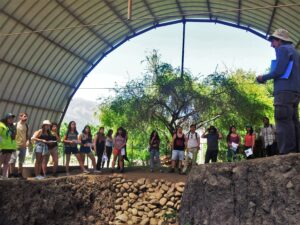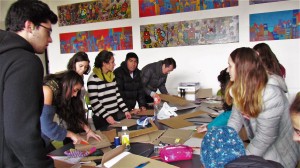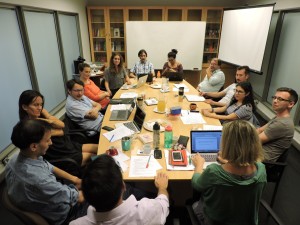IDG Interview: Dr. Marjorie Murray at Pontificia Universidad Catolica de Chile

In 2018 Pontificia Universidad Catolica de Chile received an Institutional Development Grant to support the development of a doctoral program in anthropology. Our Administrator of International Programs, Judy Kreid, recently reached out to Dr. Marjorie Murray at PUC to discuss what personally drew her to the field of anthropology, what the past and present perception of anthropology is in Chile, and what she hopes the IDG grant will help the university achieve.
First can you tell us a bit about yourself and how you came to be interested in anthropology?
I was first trained as a sociologist at Universidad Católica de Chile in the second half of the nineties, a few years after the department reopened its undergraduate degree after the Pinochet regime. In those years I learned about the relevance of social and cultural theory for understanding a range of socio-political and religious processes taking place in my country and in the region, more generally, with an emphasis on long-term historical processes. I also learned about the ethical responsibility Latin American social scientists have towards confronting the stark inequalities that characterize our societies. At the same time, I enjoyed the readings in a somewhat marginal course I took on the sociology of mass media, where I became drawn to the study of micro consumption practices and their implications in people’s lives. By 2000 I became interested in the possibilities that new information technologies could provide our population. I completed an MA in Media Studies at Goldsmiths, London, where I enriched my theoretical training and–most importantly–discovered that I was fascinated by ethnography as a methodological tool that could connect my various interests. I wrote a thesis about the uses of mobile phones and social networks of South American immigrants in the UK, for which I carried out fieldwork. I was very inspired by Danny Miller and Don Slater’s ethnography on the uses of the Internet in Trinidad, and decided to apply for a PhD in Anthropology. It was during my time at UCL that I discovered and fell in love with anthropology. I was fortunate to study in a lively department, where I met people with a variety of backgrounds and research interests; where periodic seminars, reading groups, and talks were as important as our own individual projects.
Who have been the anthropologists that have most influential in your own personal formation and why?

As an undergraduate student in sociology, I experienced what professors Pedro Morandé and Eduardo Valenzuela called “anthropology for sociologists,” in which they picked bits and pieces from the work of anthropologists to build their theoretical endeavours in the cultural sociology of Latin America. It was through them that I first acquainted myself with Mauss’s The Gift, Lévi-Strauss’s study of kinship or van Gennep’s work on rites of passage. And it was in my work as their teaching assistant that I first developed my interest in anthropology. The discovery of Bruno Latour’s work in the early 2000s was also important; it was fresh air for questioning the theoretical armature I had grown up with, while confirming the endless potential of ethnographic fieldwork. Having said this, I should note that my two PhD supervisors at UCL, Danny Miller and Martin Holbraad, were actually the most influential in my training as an anthropologist. And it was not primarily because of their exciting work and theoretical advancements, or because of the authors they introduced me to. What I value most was their openness and encouragement for me to develop my own anthropological imagination rather than imposing their own research or theoretical agendas. I also value deeply the range of opportunities I had to share and learn from fellow PhD students who were developing diverse and inspiring lines of research at UCL, including Sergio González, Diana Espirito Santo, Anna Pertierra, and Dimitris Dalakoglou to mention a few.
Can you tell us a little about anthropology in Chile? What are the pressing questions and concerns for the discipline there?
In the four-field sense, anthropology has a long history in Chile, although this history has been mostly related to the study of the indigenous populations in the country. This emphasis has generated a strong tradition of research on issues such as acculturation, intercultural relations, and indigenous development, consolidating an image of anthropology as a field that could be properly developed only within academia. At the same time, this emphasis has produced an overall perception of anthropology as a niche discipline, undermining its potential in comparison to other social sciences. This situation remained for a long time and was reinforced by a lack of university programs offering graduate training in anthropology until very recently. Nevertheless, this tendency has changed somewhat in recent decades, due to increased access to graduate training abroad, offered through Chilean government grant programs. Through such opportunities, Chilean anthropologists have been able to bring fresh insights in terms of research topics and theoretical approaches. Also, the current context has driven this new generation of anthropologists to question how they can make a difference beyond academia, expanding the professional possibilities for the discipline in Chile. At Anthropology PUC we see ourselves as part of that development, as first with our undergraduate program (that opened in 2013) and now with our graduate programs, we aim to contribute to institutionalizing this new momentum in Chilean anthropology.
Indeed, current pressing questions and concerns for the social sciences and anthropology in Chile remain those of tackling severe injustice and inequalities in a range of forms, manifestations, settings, and populations. Yet, if we want to develop anthropology’s real potential, we need to avoid reducing the discipline to a set of predefined topics and subject areas. With theoretical openness and in-depth ethnographic approaches situated in people’s everyday practices, anthropology is positioned to be the discipline that raises new questions and concerns in contexts that are often overlooked by other fields or obscured by taken-for-granted assumptions.
Is anthropology a subject that attracts students in Chile?

In Chile, anthropology is mainly a subject that attracts students who already have some idea of what the discipline is about. Currently, there are few departments offering undergraduate or master’s degrees, with just one doctoral program in the entire country. So numerically-speaking, there is a growing demand for anthropology. Unfortunately, however, most secondary students in Chile have only a vague idea of what anthropology is. And if they do know something about anthropology, they tend to have a very conventional understanding of the discipline, where anthropologists study so-called “traditional” or “non-modern” societies in a more ethnological way. We want to teach our students that anthropology can be that, but also much more; we want students to understand that in Chile, for instance, anthropologists can (and do!) study scientists and members of the political elite.
We also want to make sure that anthropologists are taken seriously on the job market, as many anthropology graduates are in competition with their peers from other social sciences, such as sociology. Among potential employers, even in NGOs and the nonprofit sector, there can be the perception of anthropologists being less rigorous or too abstract in comparison with other social scientists. We want to tell them that today, anthropologists–as we envision our graduates–can combine a critical vision of society with tangible skills and professionalism, and that they are prepared to work in a variety of different settings.
Can you tell us about your department, its specialties and how the award will help your department as it moves forward?
Our department is fairly young, with many things happening in the last few years. Soon after finishing our PhDs, I, together with Piergiorgio Di Giminiani, started the Anthropology Program in 2010 under the auspices of the Institute of Sociology. Now we have 14 faculty members. In 2013, we admitted our first class of undergraduate majors (licenciatura), which is a five-year degree, following the Chilean system of higher education. Our program emphasizes ethnographic fieldwork and the development of comparative perspectives that allow for reflection on anthropological problems from a variety of regional contexts in Chile, Latin America, and the wider world. We are proud to have graduated our first class last year. Starting this year (2018), we are also offering an archaeology major at the undergraduate level. Our faculty is characterized by a diversity of regional and thematic interests, including political ecology, violence and post-conflict transitions, the anthropology of the state, material culture, visual anthropology, religion, migration, childhood, and education; in Chile and in other Latin American countries such as Bolivia, Brazil, Cuba, Mexico, and Peru, and also in Spain and Italy. Traditionally in Chile, anthropologists have mainly studied their own country, with a particular emphasis on certain groups and cultures. By hiring anthropologists with expertise in different areas of the world, we wanted to break away a bit from this more national focus. If we want to have a more symmetric dialogue with peers and departments in the global North, we need to move away from the idea that anthropologists in developing countries can only study phenomena within their national borders. I think our choice to cross national borders is a novel and interesting direction in Chile and, in some sense, it responds to developments in other Latin American countries.
For the last two years we have been working on the creation of our graduate programs. Our master’s is a two-year program that incorporates four thematic clusters reflecting the research interests of our faculty:
(1) Environment and Emerging Worlds, (2) Personhood, Self, and the Body, (3) Politics, Difference, and Governance, and (4) Senses and Materialities. Our doctoral program is scheduled to admit its first students in 2020. The activities carried out during the five-year IDG funding period will be crucial at various levels. Investments in infrastructure will ensure that PUC PhD students have access to resources that allow them to become versed in classic and contemporary themes in the discipline, as well as to develop research projects that are engaged with anthropological issues and debates beyond Chile and Latin America. Also, we plan to develop an internal grant scheme that will help make ethnographic fieldwork a norm in the PhD program. We are particularly enthusiastic about the exchange activities with our partner institutions, which will help familiarize our professors with different traditions and experiences in doctoral training and mentoring while also contributing to students’ training at PUC and at our partner institutions. These include student exchanges and the establishment of an international advisory committee that will help the program develop guidelines, procedures, and strategies to promote its long-term success and sustainability. By the conclusion of the IDG funding period, we expect our PhD program will have advanced in becoming a vibrant and growing center for graduate training in Chile. Our hope is that the program will be a timely and enduring contribution to our discipline’s professionalization and overall development in Chile.